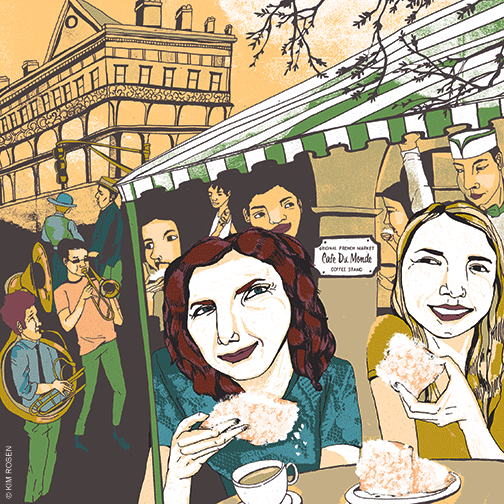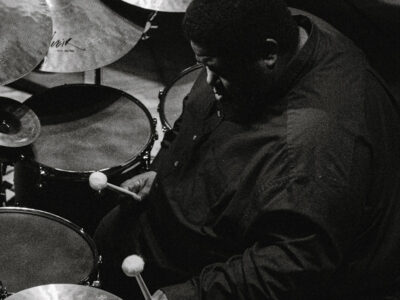
On really getting to know today’s college students.
By Beth Kephart | It had to be beignets. It had to be early on a steamy day beneath the green-and-white striped awnings of Café Du Monde, on the edge of the French Quarter.
“Meet you there,” Katie said. I said.
You buy the beignets three at a time. You dig for them beneath considerable dustings of soft-as-silk white sugar. You look up and across the table, and there she is—your former student, laughing at your incompetence with doughnuts.
This is the way an adjunct teacher’s family grows: one student at a time. One story you can’t shake. One question asked, one something confided, one breakthrough sentence, one email sent at midnight, one handwritten thank-you note for a recommendation gladly offered, one warm plate of a Creole specialty.
I teach Creative Nonfiction 135.302 at Penn, my alma mater. I teach it because I was invited, and because I said yes, even though I didn’t know the first thing about lecture notes and absentee forms, and did not own (still do not own) a single pair of worthy teaching shoes. What I had was something to say about memoir and the literature of truth. What I wore were the battle scars of my own books. What I knew was that words can heal and words can destroy, and that compassion—and beauty—matters.
Give them what you know, that’s what I told myself.
Help them understand the power of honesty and kindness.
Locate, with them, the language of meaning.
Locate, with them, their stories.
That’s all I had—something to say, something I believed in, somewhere to go. And so we began. To write toward truth. To name it, to claim it, to value it, to defend it, to come to terms with its fickle sidedness. Over decal-covered laptops, to tango songs, with the help of photographs, against the backdrop of memoir classics, we eased our way into the class, and allowed ourselves to grow vulnerable to the stories deep within.
Most semesters we would begin in the dark wet of winter and conclude in the startle of spring. We would squeeze around a massive table in a Victorian manse where we would make too much noise and be shushed by the student tutors beyond the door. We would eat fresh hummus and stuffed grape leaves from Manakeesh. We would go out into the world and return to report on our adventures. We would sit and we would listen. We would encourage and suggest. We would lean toward each other.
They were future writers and engineers, historians and neuroscientists, economists and doctors, retail managers, business people, world travelers, comediennes, wedding planners. They were young people who had never written this kind of prose before, or they were experienced writers wanting to write better. They were students who arrived early and stayed through the breaks and sometimes walked me halfway back (or all the way back) to my train at 30th Street Station so they might noodle the structure of a piece out loud, or disprove a suspicion, or make a decision about their future. My bag was perpetually heavy with books. My wrong shoes were scuffed and thin. My heart grew full, and it stayed full, and goodbye was what I dreaded.
This is how an adjunct’s family grows: By teaching one single course one semester each year, to a handful of students on the verge of something new. By sitting with them in a Sansom Street café over a four-hour lunch and tea. By dancing at their weddings and meeting their fiancés and joining the standing ovation when they take a bow. By watching them teach hip-hop to the children of West Philadelphia. By tuning in (at their request) to YouTube proof of an engineering breakthrough. By reading their stories in the pages of The Pennsylvania Gazette. By bearing witness as they take the language of choreography and conflate it with the language of memoir and finally write their necessary story.
I read what you read about the college students of our day—the titillating implications that Penn women simply and dead-heartedly calculate the return on sexual escapades; the studies suggesting that Ivy League students care only about grades (and demand, from beleaguered adjuncts, A’s); the front-page stories that depict the bartering of ADHD pills to get ahead; the end of college life as we know it, in favor of those MOOCs. I despair over the word adjunct and how it is used and what it means—and what it will never mean. I cringe at easy sentiment, for I do understand that love is a big word, a dexterous word, a word that is also full of finagle.
Still, I emphatically love my students. And I believe in them—in their many dimensions, in their capacity to change, in their eagerness to learn from the mistakes they’ve made and make something of themselves. I am humbled by the endurance of what begins in an old Victorian twin on Walnut Street, news of which comes to me over email: A job has been found. A graduate school has said yes. A novel has been accepted for publication. A summer internship is proving grueling—and perfect. A wedding is being planned. A stroke of misfortune has offered a new way of seeing. The anger is dissipating. Rome is lovely.
And sometimes, if less often, I travel to the worlds my students have crafted for themselves, which is why, in part, I went to New Orleans—to see Katie in her adopted city of baneful weather, voodoo, Buddy Bolden, steampipe songs, and tubas. She had consulted with the weather-ruined since I’d seen her last. She’d talked with the homeless and learned something about the slow rebirth of a city following the ravages of storm. She’d made a choice about medical school. She’d learned the complications of organized caring. We ate our beignets, and then to the Ninth Ward we drove—my husband and I listening as Katie helped us see New Orleans through her bright eyes.
An adjunct grows older, but a family grows, too. I wouldn’t trade my love for any season.
Beth Kephart C’82’s 16th book, Handling the Truth: On the Writing of Memoir (Gotham) was inspired by her work at Penn. She blogs at www.beth-kephart.blogspot.com.




